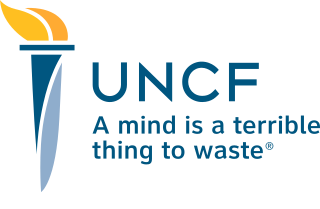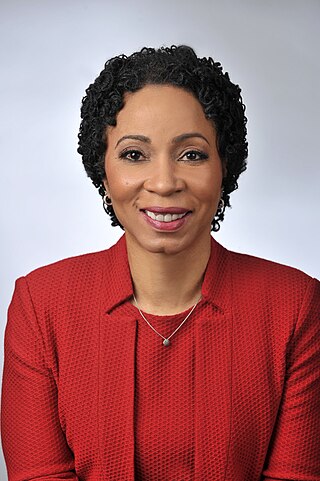Related Research Articles

UNCF, the United Negro College Fund, also known as the United Fund, is an American philanthropic organization that funds scholarships for black students and general scholarship funds for 37 private historically black colleges and universities. UNCF was incorporated on April 25, 1944, by Frederick D. Patterson, Mary McLeod Bethune, and others. UNCF is headquartered at 1805 7th Street, NW in Washington, D.C. In 2005, UNCF supported approximately 65,000 students at over 900 colleges and universities with approximately $113 million in grants and scholarships. About 60% of these students are the first in their families to attend college, and 62% have annual family incomes of less than $25,000. UNCF also administers over 450 named scholarships.

Morehouse College is a private historically Black men's liberal arts college in Atlanta, Georgia. Anchored by its main campus of 61 acres (25 ha) near Downtown Atlanta, the college has a variety of residential dorms and academic buildings east of Ashview Heights. Along with Spelman College, Clark Atlanta University, and the Morehouse School of Medicine, the college is a member of the Atlanta University Center consortium. Founded by William Jefferson White in 1867 in response to the liberation of enslaved African-Americans following the American Civil War, Morehouse adopted a seminary university model and stressed religious instruction in the Baptist tradition. Throughout the late 1800s and early 1900s, the college experienced rapid, albeit financially unstable, institutional growth by establishing a liberal arts curriculum. The three-decade tenure of Benjamin Mays during the mid-20th century led to strengthened finances, an enrollment boom, and increased academic competitiveness. The college has played a key role in the development of the civil rights movement and racial equality in the United States.

Spelman College is a private, historically Black, women's liberal arts college in Atlanta, Georgia. It is a founding member of the Atlanta University Center academic consortium. Founded in 1881 as the Atlanta Baptist Female Seminary, Spelman awarded it first college degrees in 1901 and is the oldest private historically Black liberal arts institution for women.

Louis Wade Sullivan is an active health policy leader, minority health advocate, author, physician, and educator. He served as the Secretary of the United States Department of Health and Human Services during President George H. W. Bush's Administration and was Founding Dean of the Morehouse School of Medicine.

The Atlanta University Center Consortium (AUC Consortium) is the oldest and largest contiguous consortium of African-American higher education institutions in the United States. The center consists of four historically black colleges and universities (HBCUs) in southwest Atlanta, Georgia: Clark Atlanta University, Spelman College, Morehouse College, and the Morehouse School of Medicine. The consortium structure allows for students to cross-register at the other institutions in order to attain a broader collegiate experience. They also share the Robert W. Woodruff Library, a dual degree engineering program, and career planning and placement services and the AUC Data Science Initiative.

David Satcher, is an American physician, and public health administrator. He was a four-star admiral in the United States Public Health Service Commissioned Corps and served as the 10th Assistant Secretary for Health, and the 16th Surgeon General of the United States.

Audrey Forbes Manley is an American pediatrician and public health administrator. Manley was the first African-American woman appointed as chief resident at Cook County Children's Hospital in Chicago (1962). Manley was the first to achieve the rank of Assistant Surgeon General in 1988 and later served as the eighth president of Spelman College.

Benjamin Elijah Mays was an American Baptist minister and American rights leader who is credited with laying the intellectual foundations of the American civil rights movement. Mays taught and mentored many influential activists, including Martin Luther King Jr, Julian Bond, Maynard Jackson, and Donn Clendenon, among others. His rhetoric and intellectual pursuits focused on Black self-determination. Mays' commitment to social justice through nonviolence and civil resistance were cultivated from his youth through the lessons imbibed from his parents and eldest sister. The peak of his public influence coincided with his nearly three-decade tenure as the sixth president of Morehouse College, a historically black institution of higher learning, in Atlanta, Georgia.

Morehouse School of Medicine (MSM) is a private medical school in Atlanta, Georgia. Originally a part of Morehouse College, the school became independent in 1981.

Grady Memorial Hospital is the public hospital for the city of Atlanta. The hospital is ranked as the tenth largest public hospital in the United States and is a Level I trauma center

The Interdenominational Theological Center (ITC) is a consortium of five predominantly African-American denominational Christian seminaries in Atlanta, Georgia, operating together as a professional graduate school of theology. It is the largest free-standing African-American theological school in the United States.
Theodore Kenneth (T.K.) Lawless was an American dermatologist, medical researcher, and philanthropist. He was a skin specialist, and is known for work related to leprosy and syphilis.
Robert Michael Franklin Jr. is an American author, theologian, ordained minister, and academic administrator who served as the tenth president of Morehouse College from 2007 to 2012. Franklin is a visiting scholar in residence at Stanford University's Martin Luther King Jr. Research and Education Institute. In January 2014, he became director of the religion program at the Chautauqua Institution.

Helene D. Gayle is an American physician who has served as the president of Spelman College since 2023. She formerly served as CEO of the Chicago Community Trust, one of the nation's leading community foundations.

John Willis Hurst was an American physician who served as the cardiologist of former U.S. President Lyndon B. Johnson. He was the editor of Hurst's the Heart, one of the most widely used medical textbooks in the world. He also served as a former president of the American Heart Association.

Charles DeWitt Watts was an African-American surgeon and activist for the poor. Watts was the first surgeon of African-American ancestry in North Carolina. Earning his medical degree in 1943 from Howard University College, he was the first African-American board-certified surgeon to serve in North Carolina. After surgical training at Freedman's Hospital in Washington, D.C., in 1949, he moved to Durham, North Carolina, in 1950 and established a clinic to provide access to medical services for the poor. Breaking the social customs of racial obstacles, he advocated for certification of African-American medical students. He also became a member of many professional colleges including the National Academy of Science's Institute of Medicine and the American College of Surgeons. He served as chief of surgery at Durham's Lincoln Hospital and was later one of the key figures in converting it to the Lincoln Community Health Center, a low-priced clinic for the poor.
Paul Smith is an American Presbyterian minister, mediator and civil rights activist known for creating multi-racial churches in Buffalo, St. Louis, Atlanta and Brooklyn, NY. Smith has been active in the civil rights movement since the 1950s. He has been an administrator, faculty member and trustee at seminaries and universities in St. Louis, Atlanta and New York City. He has served as a mediator and multicultural consultant to corporations and the government and has been active in organizations like the Urban League.
Valerie Montgomery Rice is an American obstetrician, gynecologist, and college administrator. She is the president and dean of Morehouse School of Medicine.
References
- 1 2 3 4 5 "GAYLES, Joseph". The Atlanta Constitution. October 7, 2008. pp. D6.
- ↑ Walker, Mark L. (1992). "The Morehouse School of Medicine Story: A Surgical Strike!". Journal of the National Medical Association. 85 (5): 396.
- 1 2 Tagami, Kirsten (October 5, 2008). "Dr. Joseph Gayles Jr., Morehouse Visionary". The Atlanta Constitution. pp. D15.
- ↑ Camp, Susan (November 7, 1977). "Talladega installs Dr. Gayles". The Anniston Star. pp. 1, 3.
- ↑ Uhlman, Marian (5 June 1983). "Gayles' legacy: Commitment to excellence". The Anniston Star. p. 4.
- ↑ "Morehouse School of Medicine Mourns Loss of a Founder". MSM News. 2008.